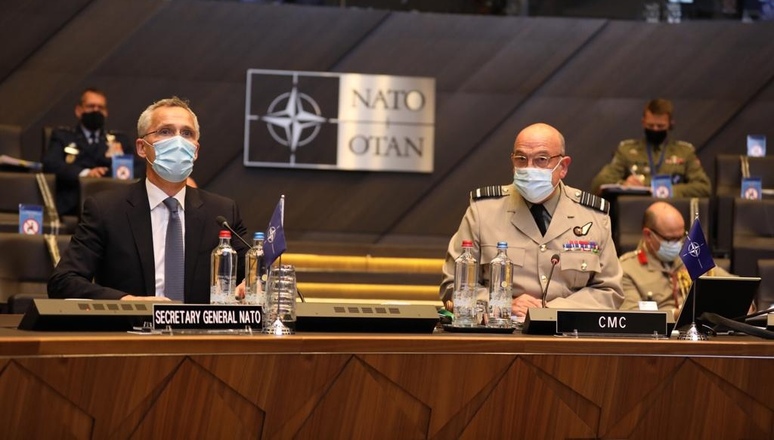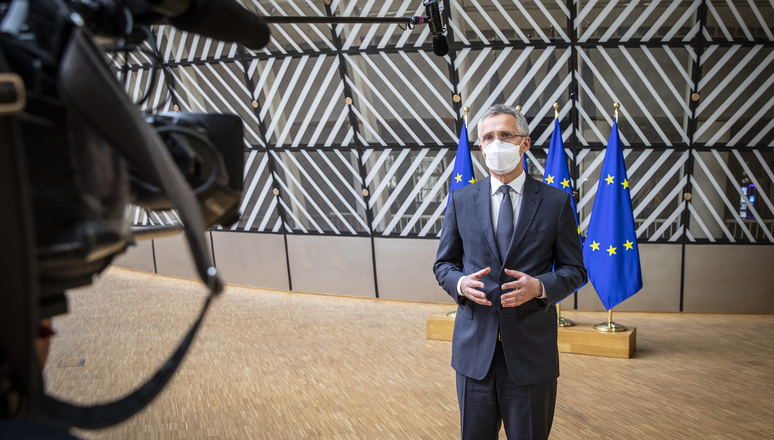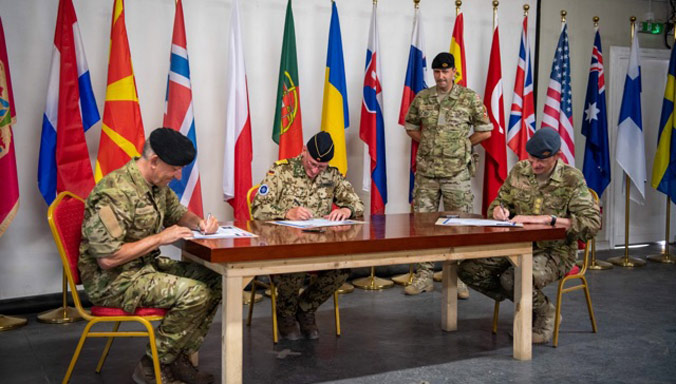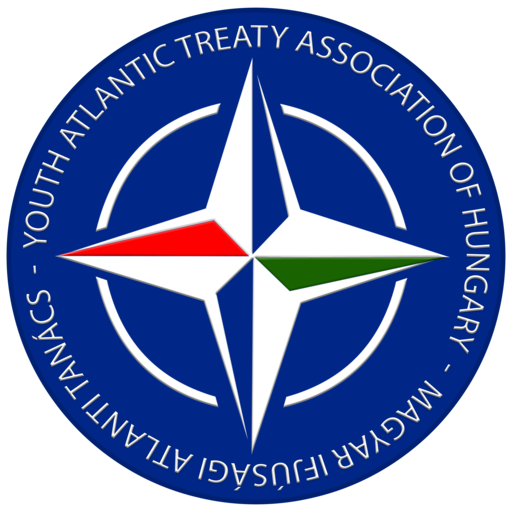In the „NATO Social Update Briefing” of the Youth Atlantic Treaty Association of Hungary, we bring you the contemporary news of the Alliance every month.
Coronavirus
NATO and Poland support to Bosnia and Herzegovina
On 6 May, Poland delivered medical equipment and supplies, including face masks and protective clothing, to Bosnia and Herzegovina in response to the COVID-19 pandemic. The donation was coordinated by NATO’s Euro-Atlantic Disaster Response Coordination Centre (EADRCC) and Poland to respond to Bosnia and Herzegovina’s urgent requirement.
Provision, storage and transportation of the donation was funded by the Polish Armed Forces Operational Command, and the Polish Military Contingent in Bosnia and Herzegovina. The distribution of the protective equipment was supported by the Polish Embassy in Sarajevo, where the supplies were handed over to the Ministry of Security for further distribution.
This support is part of the overall NATO COVID-19 assistance package. Allies have agreed to provide Bosnia and Herzegovina to address the severe effects of the COVID-19 pandemic. Other medical equipment will be delivered to Bosnia and Herzegovina in the coming weeks, under NATO’s Pandemic Response Trust Fund. This Trust Fund maintains an established stockpile of medical equipment and supplies to be able to provide immediate relief to Allies or partners in need.
Partnerships and Conferences
The Deputy Secretary General discusses EU-NATO cooperation
NATO Deputy Secretary General Mircea Geoană, speaking at a military mobility symposium jointly organised by the European Defence Agency and the Portuguese Presidency of the Council of the European Union on 6 May, stressed the importance of close NATO-EU cooperation in the field of military mobility to maintain preparedness and preserve collective security.
The Deputy Secretary General said that military mobility is essential for NATO’s deterrence and defence posture. Rapid deployment in Europe requires a whole-of-government approach, including the commercial sector, as well as civilian and military actors, not just the military.
Looking to the future, Mr Geoană stressed that “to further improve military mobility, NATO and the EU must continue to work towards coherence.” The Deputy Secretary General also welcomed the EU’s decision to approve the applications of Canada, Norway and the United States to join the PESCO project on military mobility.
Unity and adaptation are key in today’s uncertain world
At the annual Riga Conference, NATO Deputy Secretary General stressed the importance of strategic communication to help build resilience among Allied societies faced with increased hybrid activities. “Such hostile activities seek to undermine our democracies, our institutions, our shared values, on which our Alliance is founded,” he said.
As regards the COVID-19 pandemic, it has provided fertile ground for increased hybrid activities, but NATO has been able to adapt and continue to defend its one billion population.
Looking ahead, close cooperation with like-minded partners across the globe and a whole of society approach will be essential to continue to protect democratic societies against current security threats. Mr. Geoană underlined that NATO’s 2030 initiative sets an ambitious agenda for enhanced transatlantic security and defence in such an uncertain world.
Stability in the Western Balkans
On 17 May, Secretary General Jens Stoltenberg and President of the Republic of Serbia, Aleksandar Vučić met at NATO Headquarters to discuss their partnership. NATO is still committed to maintain stability in the Western Balkans.
Jens Stoltenberg expressed his gratitude towards Serbia for the country’s commitment to their partnership. He added that NATO is ready to form a stronger partnership with the country, since they face common security challenges but the Alliance fully respects their sovereignity. The Secretary General further mentioned their commitment to peace and security in the Western Balkans and pointed out the benefits of the KFOR mission as proof of their commitment. He also assured that NATO supports the Belgrade-Pristina dialogue as he believes that these dialogues are key for stability in the region and calls all parties to engage in it.

Summit to a future-proof Alliance
“Not just in words, but in deeds” – the growingly frequent use of this term by Secretary General Jens Stoltenberg indicates the Alliance’s commitment to continue last year’s political revitalisation process in the physical domain as well. The upcoming Brussels Summit is providing a unique opportunity for implementing developments and preparing for future challenges. The agenda-formulating proposals announced by the Secretary General intend to reinvigorate the transatlantic unity and the vitality of NATO amidst the ever-changing century security environment. The main discussions of the ministers will formulate around eight main topics, including the further promotion of political dialogue, resilience-building, tackling the issues of climate change, assessing the challenges and opportunities of emerging and disruptive technologies, and cooperation building around the globe. Military modernization, operational planning, and Eastern partnerships will be also on the table during the summit.
While Stoltenberg acknowledged some concerns regarding the allied forces’ withdrawal from Afghanistan, he also emphasised that NATO will continue to seek ways to support the local government.
Addressing Ukraine’s reform efforts
NATO Deputy Secretary General Mircea Geoana held talks with Ukraine’s Deputy Prime Minister for European and Euro-Atlantic Integration, Olha Stefanishyna, on 18 May. They addressed Ukraine’s reform efforts and the security situation in and around Ukraine.
The Deputy Secretary General reiterated NATO’s unwavering support for Ukraine’s sovereignty and territorial integrity and noted that the Alliance will continue to monitor Russia’s troop movements in and around Ukraine. Mr. Geoana encouraged Ukraine to make full use of its partnership framework with NATO to address current security challenges, to make Ukraine more resilient and to implement its Euro-Atlantic aspirations and key reforms.
New NATO Cyber Academy was inaugurated
On 26 May, Secretary General Jens Stoltenberg visited Lisbon for meetings to prepare the NATO summit, and to inaugurate a new cyber academy.
Mr. Stoltenberg met with Prime Minister Antonio Costa, and praised Portugal for its many contributions to NATO, such as the work to fight terrorism in Afghanistan and the Portuguese presence in Africa. He further commended Portugal for hosting NATO facilities, and for making NATO-EU cooperation a priority of the country’s presidency of the European Union.
They also discussed the situation in Belarus. Mr. Stoltenberg condemned the forced landing of the passenger jet, welcomed the sanctions agreed by the European Union and demanded the release of the journalist Raman Pratasevich and all the other political prisoners. He also urged for an immediate international investigation. Secretary General Stoltenberg and Prime Minister Costa also addressed the drawdown of troops from Afghanistan, and plans for NATO’s continuing support, including training and financial sustainment for the Afghan forces.
Mr. Stoltenberg, alongside Prime Minister Costa, inaugurated the NATO Communications and Information Academy in Oeiras. The Secretary General praised the NATO alliance for being very efficient in changing, adapting and maintaining its technological edge, and how this cyber academy will be an important help for the future personnel.
Later on Wednesday, the Secretary General attended a meeting of the Council of State, chaired by Portuguese President Marcelo Rebelo de Sousa. On Thursday, the Secretary General visited the HMS Queen Elizabeth aircraft carrier of the United Kingdom’s Royal Navy, taking part in NATO exercise Steadfast Defender 2021, and took part in a meeting of European Union Defence Ministers.
High-level Meetings
NATO Secretary General held discussions with EU Defence Ministers
NATO continues to closely monitor Russia’s significant military build-up in and around Ukraine, said NATO Secretary General Jens Stoltenberg at a meeting of European Union Defence Ministers on 6 May. Moreover, he welcomed the announcement by the EU to include Canada, Norway and the United States in PESCO projects on military mobility, enabling troops to move more quickly across Europe. “Non-EU Allies play an essential role in protecting and defending Europe,” Mr Stoltenberg said.
The Secretary General also highlighted that Russia had withdrawn some troops from Ukraine’s border but still tens of thousands of soldiers remain in the region. “Overall, there is a significant Russian presence, and there are many more Russian troops now, in and around Ukraine, than before the recent increase in tensions,” he added.
On Afghanistan, the Secretary General said that the drawdown of NATO’s Resolute Support mission is underway, but that the end of NATO’s mission does not mean the end of the Alliance’s relationship with Afghanistan. Allies are looking at how they can continue to provide financial and training support to Afghan forces.

Discussing NATO’s forward looking 2030 agenda
On 7 May, NATO Secretary General welcomed the Deputy Prime Minister and Defence Minister of Slovenia, Matej Tonin, to NATO Headquarters. They exchanged views on the preparations for the NATO Summit to be held on 14 June, including the NATO 2030 process and fairer burden sharing across the Alliance.
The Secretary General praised Slovenia for its continued contributions to Euro-Atlantic security, with Slovenian troops serving in NATO’s multinational battlegroup in Latvia, in Afghanistan and in Kosovo.
“Slovenia is one of the top contributors to KFOR” said the Secretary General, adding “you are helping to promote peace and stability across the Western Balkans. This is good for the region, and for Euro-Atlantic security.” The Secretary General underlined the importance of strong cooperation between NATO and the European Union in the region, noting that Slovenia will hold the upcoming presidency of the Council of the European Union.
Secretary General underscores Montenegro’s contributions to NATO
On 18 May, NATO Secretary General Jens Stoltenberg met with President Milo Đukanović of Montenegro in Brussels. They exchanged views on the security situation in the Western Balkans and preparations for the next NATO Summit.
“Montenegro is a valuable Ally, making important contributions to Euro-Atlantic security,” said the NATO Secretary General. He also highlighted, that Montenegro provides financial support to the Afghan Security Forces; contributes to NATO’s peacekeeping mission in Kosovo, and plays a role in building stability in the Western Balkans. NATO welcomes that Montenegro is increasing its defence spending.
He also emphasised NATO’s continued support to Montenegro, in response to the COVID-19 pandemic and in keeping the country’s airspace safe through a NATO air policing mission with jets from Italy and from Greece, for instance. “We must reinforce our defence and deterrence … and work with partners to protect the rules-based international order, and I welcome Montenegro’s support in this process,” he stressed.
Developments
NATO successfully tests Rapid Air Mobility procedures
NATO successfully tested procedures to fast-track the airlift of troops and equipment across Europe in a simulated crisis exercise in April. The three-day test of the Alliance’s “Rapid Air Mobility” initiative was held in close coordination with Eurocontrol.
“By facilitating quicker air movements across the Alliance, we can be more effective in preventing crises, more efficient in deploying our forces, and quicker in reacting when unforeseen situations arise,” said NATO Assistant Secretary General for Defence Investment Camille Grand.
NATO’s rapid air mobility initiative, or RAM, is part of the Alliance’s wider efforts to boost the readiness of Allied troops and equipment. In March 2020, RAM procedures were activated for the first time to enable the urgent transport of medical supplies in response to the COVID-19 pandemic.
NATO and Algeria strengthen scientific cooperation against terrorism
NATO and Algeria successfully concluded their first scientific project with the development of a new technology that contributes to joint counterterrorism purposes. The development of this technology has been carried out within the framework of NATO’s Science for Peace and Security Programme (SPS) that promotes dialogue and technical cooperation between NATO member states and partner nations.
This time a new terahertz imaging technology was developed by a multinational group of scientists, namely by experts from Sweden, France and Algeria. This new system will enhance the detection of dangerous materials, which might be later developed to other application, such as body scanners and environmental monitoring.
“Such a joint project reinforces the network of scientists and experts in NATO and its partner nations and contributes to the transfer of knowledge and expertise.” As Mrs. Sara Uddenberg, Deputy Head of the Mission of Sweden to NATO, noted this technological development is not only remarkable as an initiative to fight against terrorism, but also as a great symbol of the importance of partnership in defence and security among NATO members and its partners.
Missions
Denmark reaffirms its commitment to command NATO Mission Iraq
On 6 May, Lieutenant-General Michael Lollesgaard of the Danish Armed Forces assumed command of NATO Mission Iraq. He succeeds Lieutenant General Per Olsen of the Danish Armed Forces, who had commanded the mission since November 2020. NATO Mission Iraq was launched at the NATO Summit in Brussels in July 2018, following a request from the Iraqi government. It is an advisory, training and capacity-building non-combat mission that assists Iraq in building more sustainable, transparent, inclusive and effective security institutions and armed forces.

